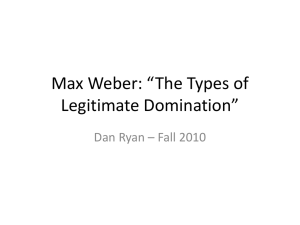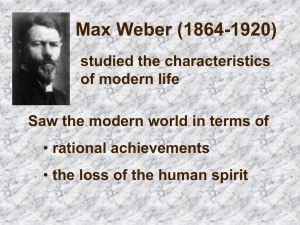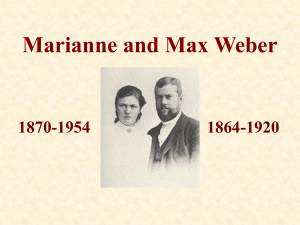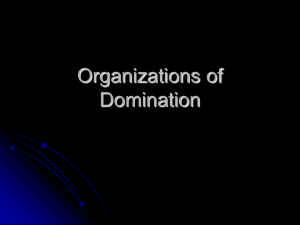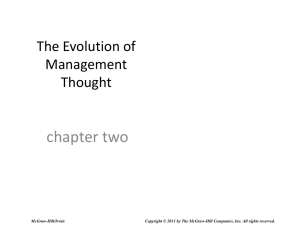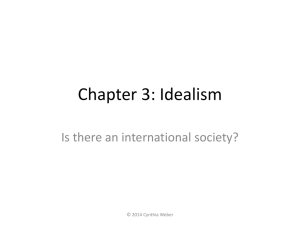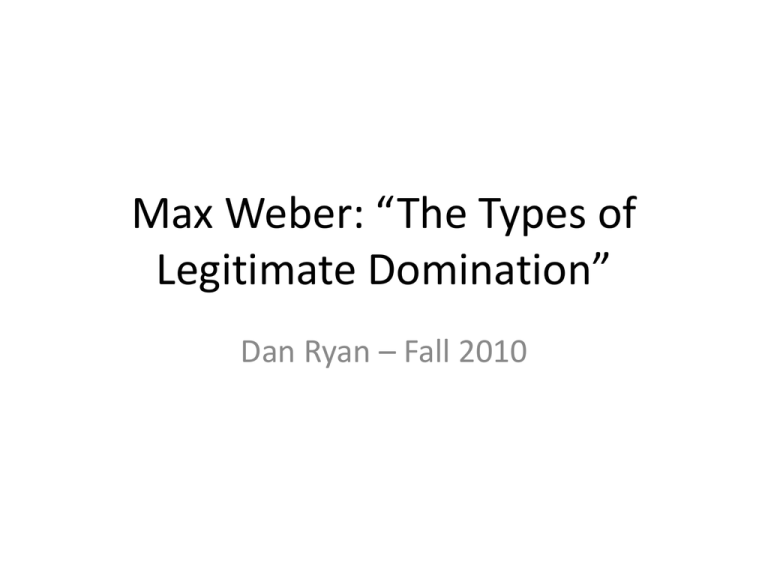
Max Weber: “The Types of
Legitimate Domination”
Dan Ryan – Fall 2010
1. Domination = probability command(s) will be
obeyed. Subtype of power and influence. Wide
variation in basis. Always a measure of
“voluntary compliance”
2. D of groups takes staff. Staff obey from custom,
affect, pay, or ideals & this determines type of
domination. But legitimacy also needed.
3. D rarely relies on custom, affect, or pay alone.
Everything about social organization of D seems
to depend on basis of legitimacy claim.
4. Legitimacy is a reasonable basis for
classifying types of domination.
5. Authority relationship is a broad category.
6. Mere “power over” not same as authority. A
involves command and obedience. But there
are gradations in real world.
7. People obey for different “real” reasons.
What’s important is how basis for validity of
authority is related to “means of its exercise.”
8. Even in regime with no legitimacy vis a vis
subjects, authority relation between leader
and staff will be classifiable.
9. Obedience = action follows content of
command without regard to actor’s own
stance.
10. Subjective process in actor not relevant
here.
11. Effects of domination as social phenomenon
extend throughout society.
12. Ideology of “leader as servant” does not
change this analysis.
13. Three types of basis for legitimate authority:
rational; traditional; charismatic.
14. Rational = legal authority based on rules.
15.Traditional = based on belief in sanctity of
“the way it’s always been done.”
16. Charismatic = based on exceptional
character of an individual
17. Variations across types in person obeyed and
what determines range of things covered.
Influence
Power
Authority
Structure of Excerpt
This excerpt has three parts. First (1-3), Weber
"announces" domination, puts it in context of
power and influence, and names some
structural issues (such as need for a staff) that
go with it. Second (4-12), he works through 7
"meta-theoretical" issues — mainly establishing
that "basis of legitimacy" has multiple structural
implications. Finally (13-17), he lays out his
three ideal types of authority/domination.
The Problem
Weber begins by defining domination distinguishing it from power and influence,
which he says are bigger categories. The German for domination here is "Herrschaft"
which could be literally translated as "lordship" as in "lordship over." This heavyhanded etymology is useful here because it implies that we really are talking about a
social relationship. For Weber, too, an important component of domination or
authority is that it includes a subjective role for the dominated: Weber says it always
"implies a minimum of voluntary compliance, that is an interest (based on ulterior
motives or genuine acceptance" in obedience" (Weber 2010, 116.3, emphasis in
original). Weber's point here is that in the case of authority relations, there is
subjective action on both sides of the relationship.
Domination over groups of people requires a staff. The problem is how to maintain
staff loyalty. Loyalty can be achieved "by custom, by affectual ties, by a purely material
complex of interests, or by ideal (wertrationale) motives" (116.5), in other words,
custom, emotional ties, pay, or beliefs. But no matter the basis, more — legitimacy —
is needed. Based on experience, Weber notes, different kinds of legitimacy give rise
to different "type[s] of obedience," "kind[s] of administrative staff," and "mode[s] of
exercising authority" (116.7).1
1.
Weber's analytical precision starts to show through here. We might note that this is a suggestion of four dimensions or components of domination: 1)
type of obedience (wdtm?); 2) kind of staff (read "organization of staff"); 3) mode of authority exercise (wdtm?); 4) "variation in effect."
Meta-Theoretical Considerations
(para 5) The concept of authority represents a continuum of types of social relationships. It is
present to a different degree in different realms governed by law and custom, but we'd say it
exists whenever there is some degree of "voluntariness" on the side of the subject. Just having
power — as when a bank exercises monopolistic control — is not enough to call it "authority" per
se (para 6, 117.5).
Sociologically, we are interested in the patterns of people obeying commands and the overall
basis of the claim that the commands are legitimate. Even if people only obey cynically, we can
still try to ascertain how the supposed validity of the commands is framed (para 7, 117.7). And
further, even if the ultimate subjects of a ruler are so powerless that we cannot talk about them
in these terms, the staff that the rule uses to control them will be loyal to him on the basis of
something and this can be examined in terms of types of legitimate authority.
Weber continues with a definition of "obedience": when the action of the person obeying follows
the "content of the command" enough that you can identify one with the other and that this
comes from the fact of the command not the actors own intentions. In other words, we would
not call it obedience if A tells B to do something B was going to do anyway (para 9, 118.3). Still,
the subjective experience of "obeying" can vary, but this doesn't affect our efforts to categorize
here (para 10, 118.4). Neither, for that matter does the fact that in some systems we talk about
leaders as "servants" of the lead (para 12, 118.5).
The Pure Types
1. Rationally based authority rests on belief in
rules and we obey persons who are elevated, by
rules, to position of authority.
2. Tradition based authority rests on "the way it's
always been" and we obey individuals granted
authority by tradition.
3. Charismatic authority rests on the exceptional
qualities of a particular person.
In each case, the "authority" specifies both who has
it and what it covers. And, for Weber, it’s the BASIS
of LEGITIMACY that creates the types.

